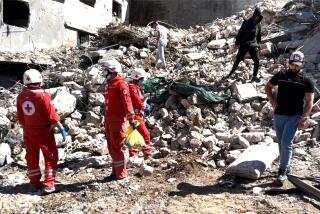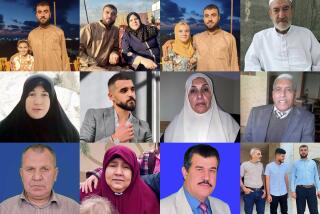Kenyan Farmer ‘Burned’ by Touch of Suspected Bombers
- Share via
MSUMARINI, Kenya — As Kenyan and Israeli investigators squabbled Sunday over critical evidence found at the scene of a terrorist strike here, a subsistence farmer described how he shook hands with suicide bombers mere minutes before they attacked a packed seaside resort, killing 13 people plus themselves.
“These are not good people. I shook hands with fire,” said Khamis Haro Deche, 39, describing two men who had parked their sport utility vehicle in front of his mud hut Thursday morning. “When you shake hands with fire, you will get burned. My heart is burned because they have done something very serious.”
Deche may have been the last to come face-to-face with bombers who brought terror to this quiet village on the shores of the Indian Ocean. Israel said Sunday that the bombing at the Paradise hotel, along with the near-simultaneous firing of two missiles at an Israeli airliner leaving nearby Mombasa, appeared to be the work of Osama bin Laden’s Al Qaeda network, not Palestinian groups.
Israeli Prime Minister Ariel Sharon has ordered his Mossad spy agency to hunt down and punish planners of the attacks. But Sunday, Mossad agents and Kenyan police fought over vital pieces of evidence.
Kenyan investigators said they would prevent Israeli bomb experts, who continued to sift through the ruins of the resort Sunday, from taking to Israel parts of the Mitsubishi Pajero used in the bomb attack as well as rocket launchers and missile casings found near the Mombasa airport.
“None of this evidence is going back to Israel. This evidence is our responsibility,” said Charles Jamu, a Kenyan bomb specialist.
Mossad agents were becoming increasingly dissatisfied with the way local investigators were handling the probe. Scores of looky-loos have traipsed through the site of the bombing, and sensitive evidence has been paraded before the media.
“They’re no use except to smile at you,” an Israeli security official at the site said of Kenyan investigators.
Ranaan Gissin, a spokesman for Sharon, was more sympathetic.
“Look, it’s a Third World country. The norms are different, the bureaucracy is different,” he told reporters in Israel. “They are very nice, they are trying to do the best they can. But it’s not up to the standards” of the developed world.
Kenyan Internal Security Minister Julius Sunkuli defended local investigators over the weekend, saying they had the knowledge and skills to handle a terror case.
Israeli and Kenyan officials did apparently cooperate in the interview of Deche. The farmer said he was awakened about 8 a.m. Thursday by his 13-year-old daughter, who told him a strange vehicle was parked in their yard. Deche went out to greet the men and ask how they were doing.
“We are fine,” a slim passenger in the front seat said in Arabic-accented Swahili, according to Deche. The farmer said that when he offered a handshake, the men appeared nervous. He said he also thought it was strange that several mobile phones lined the dashboard of their vehicle.
According to Deche, the men assured him that they were simply waiting for a friend. The farmer memorized the vehicle’s license plate number and returned to his two-room hut made of mud and palm branches.
Minutes later, the explosives-laden Pajero was driven into the Paradise hotel. Kenyan police said three suicide bombers were killed, along with 10 Kenyans and three Israeli tourists. Deche said the blast rocked his hut, causing him, his wife and their five children to hit the dirt floor.
Deche said he was interrogated at his home Friday by four Kenyan police officers, who returned the next day with some “white men” believed to be Mossad agents. On Sunday night, Deche returned home from visiting a sick brother to find a dozen reporters camped in front of his house.
Deche lamented that he did not have a phone. “If I had [one], I would have called” the police, he said.
The blast, he said, pushed his family further into poverty. His young daughters will no longer be able to earn money by collecting firewood for the Paradise hotel.
On Sunday, Israeli Defense Minister Shaul Mofaz for the first time said the evidence pointed to Al Qaeda. “We have reason to believe that Al Qaeda was connected to [the attacks in Kenya],” Mofaz said. “The terrorists’ intention was to cause a far greater disaster, and from now on we should make every effort to strike also those terrorist organizations which share neither territorial nor moral borders with us.”
In the aftermath of the attacks, questions have arisen in London about possible hints during past weeks that Israelis in East Africa would be targeted.
Sheik Omar Bakri Mohammed, a well-known Islamic activist in London, says he ran across a possible threatening prediction on the Internet eight days before the attacks in Kenya.
The warning came in the form of a letter in Arabic reached via an Internet chat room that is popular with Muslim activists, Bakri said in an interview Sunday. The anonymous author predicted “good news for all Muslims” and warned that Israel would pay a price for what the author called its mistreatment of Palestinians, according to Bakri, who heads the aggressively fundamentalist Al Muhajiroun movement.
The letter’s most premonitory statement, according to Bakri: “You are going to hear good news about Israelis in East Africa.”
“Maybe it was someone who was bluffing, maybe it was someone who was serious,” Bakri said. “They did not mention Kenya specifically. But the writing indicated that the person who wrote it was a mature person. It quoted verses of the Koran. It didn’t seem like someone fooling around.”
Bakri said that he has tried to reconnect with the letter since the attacks, but that the link provided by the author is no longer accessible.
*
Maharaj reported from Msumarini and Rubin from Jerusalem. Times staff writer Sebastian Rotella in London contributed to this report.
More to Read
Sign up for Essential California
The most important California stories and recommendations in your inbox every morning.
You may occasionally receive promotional content from the Los Angeles Times.










